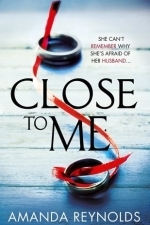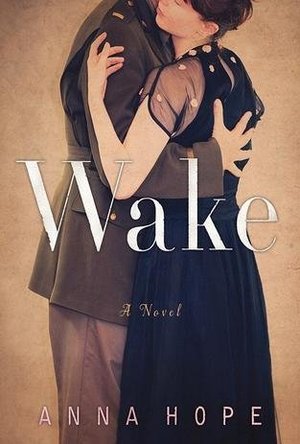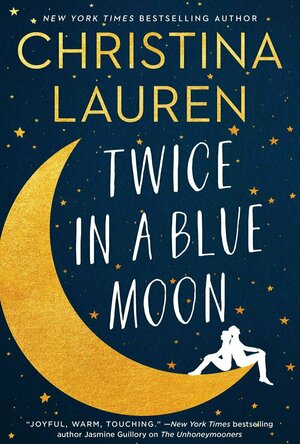Search
Search results
Beckie Shelton (40 KP) rated Close To Me in Books
Feb 8, 2018
Reviewed By Beckie Bookworm
https://www.beckiebookworm.com
<a href="http://s1376.photobucket.com/user/rosella1974/media/BookReview_zpsdq9da8x6.jpg.html"; target="_blank"><img src="http://i1376.photobucket.com/albums/ah5/rosella1974/BookReview_zpsdq9da8x6.jpg~original"; border="0" alt=" photo BookReview_zpsdq9da8x6.jpg"/></a>
Really enjoyed Close To Me by Amanda Reynolds, wasn't sure what to expect this being a debut author but I certainly wasn't disappointed.
Close To Me tells the story of Jo Harding after she falls down stairs hitting her head and losing her memory of the past year.
On coming home things feel different and disjointed, Jo feels there is an undercurrent of deceit, secrets being kept from her by her husband and children and as she unravels the mysteries of the past year things escalate to a shocking conclusion.
So this was a great psychological read, it kept my interest and pulled me in, the writing was superb, and the storyline very easy to follow.
Close to me is told in two parts, real-time and snippets of the past year, though it has a slow build this is not a bad thing as you get to understand Jo's life and how she is the person she is.
The characters here felt real and human, some you could sympathise with others not so much.
If I had to pick my least favourite person in this, it would have to be the daughter I found her very self-centred and immature, but she's a product of her overindulged upbringing.
I myself have grown up children there is no way on this planet I would be paying for their accommodation.
what a right spoilt brat Sash is.
<a href="http://s1376.photobucket.com/user/rosella1974/media/056f5b7_zps2sesp0wq.jpg.html"; target="_blank"><img src="http://i1376.photobucket.com/albums/ah5/rosella1974/056f5b7_zps2sesp0wq.jpg~original"; border="0" alt=" photo 056f5b7_zps2sesp0wq.jpg"/></a>
Close to me delves into the dynamics of family and the resulting aftermath when things ultimately implode.
I did kind of guess where this was going but it didn't detract from my overall enjoyment reading this.
Would I recommend this? Hell Yeah!!!
It was an engaging read.
Thank you to NetGalley, publisher and the author for providing me with an arc of Close to me
This is my own honest unbiased opinion.
<a href="http://s1376.photobucket.com/user/rosella1974/media/Happy-Reading-1_zpsvky3whcs.png.html"; target="_blank"><img src="http://i1376.photobucket.com/albums/ah5/rosella1974/Happy-Reading-1_zpsvky3whcs.png~original"; border="0" alt=" photo Happy-Reading-1_zpsvky3whcs.png"/></a>
Reviewed By Beckie Bookworm
https://www.beckiebookworm.com/
https://www.facebook.com/beckiebookworm/
https://www.beckiebookworm.com
<a href="http://s1376.photobucket.com/user/rosella1974/media/BookReview_zpsdq9da8x6.jpg.html"; target="_blank"><img src="http://i1376.photobucket.com/albums/ah5/rosella1974/BookReview_zpsdq9da8x6.jpg~original"; border="0" alt=" photo BookReview_zpsdq9da8x6.jpg"/></a>
Really enjoyed Close To Me by Amanda Reynolds, wasn't sure what to expect this being a debut author but I certainly wasn't disappointed.
Close To Me tells the story of Jo Harding after she falls down stairs hitting her head and losing her memory of the past year.
On coming home things feel different and disjointed, Jo feels there is an undercurrent of deceit, secrets being kept from her by her husband and children and as she unravels the mysteries of the past year things escalate to a shocking conclusion.
So this was a great psychological read, it kept my interest and pulled me in, the writing was superb, and the storyline very easy to follow.
Close to me is told in two parts, real-time and snippets of the past year, though it has a slow build this is not a bad thing as you get to understand Jo's life and how she is the person she is.
The characters here felt real and human, some you could sympathise with others not so much.
If I had to pick my least favourite person in this, it would have to be the daughter I found her very self-centred and immature, but she's a product of her overindulged upbringing.
I myself have grown up children there is no way on this planet I would be paying for their accommodation.
what a right spoilt brat Sash is.
<a href="http://s1376.photobucket.com/user/rosella1974/media/056f5b7_zps2sesp0wq.jpg.html"; target="_blank"><img src="http://i1376.photobucket.com/albums/ah5/rosella1974/056f5b7_zps2sesp0wq.jpg~original"; border="0" alt=" photo 056f5b7_zps2sesp0wq.jpg"/></a>
Close to me delves into the dynamics of family and the resulting aftermath when things ultimately implode.
I did kind of guess where this was going but it didn't detract from my overall enjoyment reading this.
Would I recommend this? Hell Yeah!!!
It was an engaging read.
Thank you to NetGalley, publisher and the author for providing me with an arc of Close to me
This is my own honest unbiased opinion.
<a href="http://s1376.photobucket.com/user/rosella1974/media/Happy-Reading-1_zpsvky3whcs.png.html"; target="_blank"><img src="http://i1376.photobucket.com/albums/ah5/rosella1974/Happy-Reading-1_zpsvky3whcs.png~original"; border="0" alt=" photo Happy-Reading-1_zpsvky3whcs.png"/></a>
Reviewed By Beckie Bookworm
https://www.beckiebookworm.com/
https://www.facebook.com/beckiebookworm/
Darren (1599 KP) rated A Long Way Down (2014) in Movies
Jun 20, 2019
Story: A Long Way Down starts on New Year’s Eve as disgraced TV celebrity Martin (Brosnan) is planning to kill himself only to get interrupted by the lonely Maureen (Collette), heartbroken Jess (Poots) and cancer stricken JJ (Paul) who are also using the same rooftop to plan their suicide.
All going against the suicide the four make a pact to not kill themselves until at least Valentine’s day and support each other through the six weeks once the tabloids want to make a story of why they were together. The four become good friends exposing their own secrets to why they want to escape their lives.
Thoughts on A Long Way Down
Characters/Performance – Martin is the disgraced TV talk show host, his small mistake has ruined his career, his family and even finding himself in jail. Now out of jail he wants to kill himself to get away from the headlines. Maureen is a single mother spending everyday looking after her disabled son, not getting any real free time. Jess is the daughter of politician whose sister vanished a few years before, she is a lost soul in the world turning to the drinks and drugs. JJ is an American musician who can’t find his place in the world.
Performance wise, I feel all four of the main actors give brilliant performances, Paul and Poots both show that this could be one of their best of their careers in film, while Brosnan and Collette must have theirs put on their underrated performances of their careers.
Story – The story shows the struggles everyday people can have with depression, it shows that you can get support from people you didn’t even know. I think this film tackles the issues of depression on a brilliant level, and shows just how you can find light in the strangest places.
Settings – The settings are used to show just how different the location these four have come from, it shows just how important finding help outside your comfort zone can be.
Final Thoughts – This is a film I didn’t expect too much from and I can say I truly enjoyed the film, the characters all feel real, their problems feel real and most importantly the answers to the problems didn’t cure everything they helped them realizes how important they are.
Overall: This is a very underrated film I feel people should be seeing.
https://moviesreview101.com/2017/09/15/a-long-way-down-2014/
All going against the suicide the four make a pact to not kill themselves until at least Valentine’s day and support each other through the six weeks once the tabloids want to make a story of why they were together. The four become good friends exposing their own secrets to why they want to escape their lives.
Thoughts on A Long Way Down
Characters/Performance – Martin is the disgraced TV talk show host, his small mistake has ruined his career, his family and even finding himself in jail. Now out of jail he wants to kill himself to get away from the headlines. Maureen is a single mother spending everyday looking after her disabled son, not getting any real free time. Jess is the daughter of politician whose sister vanished a few years before, she is a lost soul in the world turning to the drinks and drugs. JJ is an American musician who can’t find his place in the world.
Performance wise, I feel all four of the main actors give brilliant performances, Paul and Poots both show that this could be one of their best of their careers in film, while Brosnan and Collette must have theirs put on their underrated performances of their careers.
Story – The story shows the struggles everyday people can have with depression, it shows that you can get support from people you didn’t even know. I think this film tackles the issues of depression on a brilliant level, and shows just how you can find light in the strangest places.
Settings – The settings are used to show just how different the location these four have come from, it shows just how important finding help outside your comfort zone can be.
Final Thoughts – This is a film I didn’t expect too much from and I can say I truly enjoyed the film, the characters all feel real, their problems feel real and most importantly the answers to the problems didn’t cure everything they helped them realizes how important they are.
Overall: This is a very underrated film I feel people should be seeing.
https://moviesreview101.com/2017/09/15/a-long-way-down-2014/
<i>I received this book for free through Goodreads First Reads.</i>
<i>Wake</i> is a historical, debut novel by the British author, Anna Hope. Set in 1920 the story spans itself over five days, from Sunday 7th November until Thursday 11th November – Armistice Day. It is a story about the aftermath of the First World War and how individuals deal with the loss of loved ones, as well as their relationships with those around them.
The novel tells the story of three different women. None of them know of each other, nor even meet during the course of the narrative. However, they are connected through relationships and acquaintances with other people. There is Hettie, a young woman who works as a dance instructress at the Hammersmith Palais. Her brother fought in and survived the war only to return shell shocked and unable to cope. Evelyn, just short of 30, lost someone dear to her. Her brother, however, survived but he is also greatly affected by what he has done. Finally, there is Ada, a mother of a soldier who died from his wounds. Unable to let go of tragedy she is slowly, unknowingly, pushing her husband away.
The title of the novel initially gives an indication of what the story may contain. The most common definition is about waking up – emerging from sleep. There is slightly less focus on this meaning, nevertheless, toward the end of the book Ada is, in a way, waking up out of the past and concentrating on the here and now. Wake is also the term for a ritual of the dead. The story takes place in the days leading up to Armistice Day, the day when the Unknown Warrior was brought to England and buried in London. The final meaning, and most important in terms of this novel’s content, is consequence or aftermath. Every character, not just the three women, is dealing with the repercussions of war.
Hope has conducted in-depth research with the result that <i>Wake</i> gives a powerful insight into the lives of Londoners at that difficult time. It shocks the reader by revealing the awfulness and pain – emotionally and physically – people went through. As well as war, the book heavily focuses on family and romantic relationships, and even encompasses a hint of mystery, not in the crime thriller sense, but enough to keep the reader engaged and eager to discover the truth.
Admittedly, the beginning did not appear to have a clear plot line, but once the secrets and revelations begin cropping up, the book takes off and becomes an enjoyable read.
<i>Wake</i> is a historical, debut novel by the British author, Anna Hope. Set in 1920 the story spans itself over five days, from Sunday 7th November until Thursday 11th November – Armistice Day. It is a story about the aftermath of the First World War and how individuals deal with the loss of loved ones, as well as their relationships with those around them.
The novel tells the story of three different women. None of them know of each other, nor even meet during the course of the narrative. However, they are connected through relationships and acquaintances with other people. There is Hettie, a young woman who works as a dance instructress at the Hammersmith Palais. Her brother fought in and survived the war only to return shell shocked and unable to cope. Evelyn, just short of 30, lost someone dear to her. Her brother, however, survived but he is also greatly affected by what he has done. Finally, there is Ada, a mother of a soldier who died from his wounds. Unable to let go of tragedy she is slowly, unknowingly, pushing her husband away.
The title of the novel initially gives an indication of what the story may contain. The most common definition is about waking up – emerging from sleep. There is slightly less focus on this meaning, nevertheless, toward the end of the book Ada is, in a way, waking up out of the past and concentrating on the here and now. Wake is also the term for a ritual of the dead. The story takes place in the days leading up to Armistice Day, the day when the Unknown Warrior was brought to England and buried in London. The final meaning, and most important in terms of this novel’s content, is consequence or aftermath. Every character, not just the three women, is dealing with the repercussions of war.
Hope has conducted in-depth research with the result that <i>Wake</i> gives a powerful insight into the lives of Londoners at that difficult time. It shocks the reader by revealing the awfulness and pain – emotionally and physically – people went through. As well as war, the book heavily focuses on family and romantic relationships, and even encompasses a hint of mystery, not in the crime thriller sense, but enough to keep the reader engaged and eager to discover the truth.
Admittedly, the beginning did not appear to have a clear plot line, but once the secrets and revelations begin cropping up, the book takes off and becomes an enjoyable read.
Hazel (1853 KP) rated Divergent Thinking: YA Authors on Veronica Roth's Divergent Trilogy in Books
Dec 17, 2018
My rating: 4.5
<i>This eBook was provided by the publisher via NetGalley in exchange for an honest review</i>
For fans of Veronica Roth’s <i>Divergent</i> series here is a book that delves deeper into the trilogy. Commonly referred to as “the next <i>Hunger Games</i>” Leah Wilson has compiled together several essays that treat <i>Divergent</i> in its own right. <i>Divergent Thinking: YA Authors on Veronica Roth’s Divergent Trilogy</i> is full of a variety of ideas each expressed by a different well-known author.
Although <i>Divergent</i> is a dystopian novel leaning heavily towards the science fiction genre, the essays in this book compare the storyline and its components with reality. Through the complex heroine, Tris, the reader learns about family values, friendships, secrets and lies – all of these things being something that is experienced within everyone’s lives.
What are really interesting are the various authors’ perceptions on Roth’s use of factions - from this stem essays on personality types, life choices, psychology, bravery and science. <i>Divergent Thinking</i> is full of thought-provoking ideas that many readers would not have considered when first reading the trilogy. These authors make the reader think more about their own lives in relation to Tris and Tobias’. Most importantly Wilson’s compilation draws attention to the amount of research Roth must have done in order to create a dystopian future.
What is particularly good about this book is that the authors treat the characters as people in their own right with their own personalities and opinions. Instead of criticizing the way Roth has portrayed someone they comment instead on how they disagree with a particular characters thought or action. This proves, in a way, the brilliance behind Roth’s writing. Through reading <i>Divergent</i> we are not only staring at a page of writing, we are drawn directly into the storyline.
To be able to appreciate the essays included in this book readers need to already have a good understanding of the original novels, in other words read the trilogy first. There are also many spoilers for those who have not yet reached the final installment, <i>Allegiant</i>. It would also help to be a fan of <i>Divergent</i> as all these authors clearly are. Overall this is such a fascinating read. Some chapters are more interesting than others but that will also depend on the reader. If you prefer science and facts there are essays in here for you, likewise if you prefer a more personal touch there is something for you too.
<i>This eBook was provided by the publisher via NetGalley in exchange for an honest review</i>
For fans of Veronica Roth’s <i>Divergent</i> series here is a book that delves deeper into the trilogy. Commonly referred to as “the next <i>Hunger Games</i>” Leah Wilson has compiled together several essays that treat <i>Divergent</i> in its own right. <i>Divergent Thinking: YA Authors on Veronica Roth’s Divergent Trilogy</i> is full of a variety of ideas each expressed by a different well-known author.
Although <i>Divergent</i> is a dystopian novel leaning heavily towards the science fiction genre, the essays in this book compare the storyline and its components with reality. Through the complex heroine, Tris, the reader learns about family values, friendships, secrets and lies – all of these things being something that is experienced within everyone’s lives.
What are really interesting are the various authors’ perceptions on Roth’s use of factions - from this stem essays on personality types, life choices, psychology, bravery and science. <i>Divergent Thinking</i> is full of thought-provoking ideas that many readers would not have considered when first reading the trilogy. These authors make the reader think more about their own lives in relation to Tris and Tobias’. Most importantly Wilson’s compilation draws attention to the amount of research Roth must have done in order to create a dystopian future.
What is particularly good about this book is that the authors treat the characters as people in their own right with their own personalities and opinions. Instead of criticizing the way Roth has portrayed someone they comment instead on how they disagree with a particular characters thought or action. This proves, in a way, the brilliance behind Roth’s writing. Through reading <i>Divergent</i> we are not only staring at a page of writing, we are drawn directly into the storyline.
To be able to appreciate the essays included in this book readers need to already have a good understanding of the original novels, in other words read the trilogy first. There are also many spoilers for those who have not yet reached the final installment, <i>Allegiant</i>. It would also help to be a fan of <i>Divergent</i> as all these authors clearly are. Overall this is such a fascinating read. Some chapters are more interesting than others but that will also depend on the reader. If you prefer science and facts there are essays in here for you, likewise if you prefer a more personal touch there is something for you too.
Kristy H (1252 KP) rated Twice in a Blue Moon in Books
Oct 24, 2019
Tate first fell in love on a trip to London, where she met the mysterious Sam Brandis. They shared all their deepest secrets and dreams together every night in their hotel's garden. It was a whirlwind, beautiful romance. Sam was the only person that Tate told her biggest secret: she is the daughter of one of Hollywood's biggest film stars. But their brief love story ended abruptly when Sam betrayed Tate, revealing her secret and outing her to the world. Now, fourteen years later, Tate is a famous actress herself. She's on set on her biggest project to date. The last person she's expecting to see is Sam Brandis. But here he is. Now Tate is forced to confront what happened fourteen years ago--and how it has affected her all these years later.
"What would you do if you got a second chance with your first love?"
Well, I was totally caught up in this captivating romance. I'm a real sucker for Hollywood drama, so this was right up my alley. The daughter of a Hollywood star, who abandoned her and her Mom after a messy divorce? Said daughter grows up and decides to be a film star after being outed by her first love? I'm so in.
This Christina Lauren novel is told just from Tate's point of view, so we don't get some of the back-and-forth POV that we see in some of the duo's other books. There is more drama, less witty banter, than we might see in other books. But there's still plenty of the usual lies, longing, and misunderstandings. There are also lots of sexy moments and romantic interludes, too.
Tate is a fun character; I liked the divide between young Tate and Sam and then cutting to them fourteen years later. Honestly, older Tate is a little clueless at times. It takes her a while to catch on to things that seem pretty obvious to the rest of us. As usual, some things are rather predictable and other moments are a bit overblown, but it didn't diminish my enjoyment of the book. While Sam and Tate might not have had a constant humorous dialogue going, I liked the seriousness that the book brought to their relationship, as well as the funny moments it dropped in too. Tate's family, friends, and co-stars add a lighthearted touch, too.
Overall, this is a sweet, engaging romance. I loved the Hollywood aspect and the changing dynamic between Tate and Sam. 4 stars.
"What would you do if you got a second chance with your first love?"
Well, I was totally caught up in this captivating romance. I'm a real sucker for Hollywood drama, so this was right up my alley. The daughter of a Hollywood star, who abandoned her and her Mom after a messy divorce? Said daughter grows up and decides to be a film star after being outed by her first love? I'm so in.
This Christina Lauren novel is told just from Tate's point of view, so we don't get some of the back-and-forth POV that we see in some of the duo's other books. There is more drama, less witty banter, than we might see in other books. But there's still plenty of the usual lies, longing, and misunderstandings. There are also lots of sexy moments and romantic interludes, too.
Tate is a fun character; I liked the divide between young Tate and Sam and then cutting to them fourteen years later. Honestly, older Tate is a little clueless at times. It takes her a while to catch on to things that seem pretty obvious to the rest of us. As usual, some things are rather predictable and other moments are a bit overblown, but it didn't diminish my enjoyment of the book. While Sam and Tate might not have had a constant humorous dialogue going, I liked the seriousness that the book brought to their relationship, as well as the funny moments it dropped in too. Tate's family, friends, and co-stars add a lighthearted touch, too.
Overall, this is a sweet, engaging romance. I loved the Hollywood aspect and the changing dynamic between Tate and Sam. 4 stars.
Ivana A. | Diary of Difference (1171 KP) rated Eternal Soul in Books
Feb 3, 2020
<a href="https://diaryofdifference.com/">Blog</a>; | <a href="https://www.facebook.com/diaryofdifference/">Facebook</a>; | <a href="https://twitter.com/DiaryDifference">Twitter</a>; | <a href="https://www.instagram.com/diaryofdifference/">Instagram</a>; | <a href="https://www.pinterest.co.uk/diaryofdifference/pins/">Pinterest</a>;
#1 <a href="https://www.goodreads.com/review/show/2720127654">Eternal Soul</a> - ★★★
#2 <a href="https://www.goodreads.com/review/show/2720128155">Eternal Love</a> - Not Read Yet
<img src="https://i0.wp.com/diaryofdifference.com/wp-content/uploads/2019/06/Book-Review-Banner-4.png?ssl=1&w=510"/>;
Eternal Soul by Karimah Colden was a mysterious and adventurous read for me. The author contacted me and the book seemed to have an interesting plot, so I said - yes, I would love to read it.
Reign is a very private person and keeps everything close to her heart. She is a descendant of powerful hoodoo magick and her family has some dark secrets.
One day, her father appears in her life, which happens very rarely. She can feel trouble and danger, and before she knows it, her world is full of magick and discovering herself again. The one thing that she always denied - her powers - will now be something she will have to embrace and live with.
I really liked Reign and how she was portrayed. There was great character development, which was something I really admired. I loved how she slowly was finding herself throughout the book and did what felt was the best decision for her at each time. I am not sure about the romance and the relationships she formed with both men. It all happened too fast, too unrealistic and too predictable. The book also had a lot of repetitiveness as well, especially in the many scenes when it came to fashion choices and Reign was standing in from of her closet. It felt like deja-vu every time I read about it.
<b>But I still enjoyed Eternal Soul a lot.</b>
Despite the deja-vu's, despite the grammar errors. It is a cute short-ish read and I loved finding out what happens next. I also have the second book of the series as well, and will definitely be reading it soon.
If you like something young-adult, with a bit of magic and self-discovery, and something new and different, go for it, and you might be surprised! Definitely worth giving it a chance!
<a href="https://diaryofdifference.com/">Blog</a>; | <a href="https://www.facebook.com/diaryofdifference/">Facebook</a>; | <a href="https://twitter.com/DiaryDifference">Twitter</a>; | <a href="https://www.instagram.com/diaryofdifference/">Instagram</a>; | <a href="https://www.pinterest.co.uk/diaryofdifference/pins/">Pinterest</a>;
#1 <a href="https://www.goodreads.com/review/show/2720127654">Eternal Soul</a> - ★★★
#2 <a href="https://www.goodreads.com/review/show/2720128155">Eternal Love</a> - Not Read Yet
<img src="https://i0.wp.com/diaryofdifference.com/wp-content/uploads/2019/06/Book-Review-Banner-4.png?ssl=1&w=510"/>;
Eternal Soul by Karimah Colden was a mysterious and adventurous read for me. The author contacted me and the book seemed to have an interesting plot, so I said - yes, I would love to read it.
Reign is a very private person and keeps everything close to her heart. She is a descendant of powerful hoodoo magick and her family has some dark secrets.
One day, her father appears in her life, which happens very rarely. She can feel trouble and danger, and before she knows it, her world is full of magick and discovering herself again. The one thing that she always denied - her powers - will now be something she will have to embrace and live with.
I really liked Reign and how she was portrayed. There was great character development, which was something I really admired. I loved how she slowly was finding herself throughout the book and did what felt was the best decision for her at each time. I am not sure about the romance and the relationships she formed with both men. It all happened too fast, too unrealistic and too predictable. The book also had a lot of repetitiveness as well, especially in the many scenes when it came to fashion choices and Reign was standing in from of her closet. It felt like deja-vu every time I read about it.
<b>But I still enjoyed Eternal Soul a lot.</b>
Despite the deja-vu's, despite the grammar errors. It is a cute short-ish read and I loved finding out what happens next. I also have the second book of the series as well, and will definitely be reading it soon.
If you like something young-adult, with a bit of magic and self-discovery, and something new and different, go for it, and you might be surprised! Definitely worth giving it a chance!
<a href="https://diaryofdifference.com/">Blog</a>; | <a href="https://www.facebook.com/diaryofdifference/">Facebook</a>; | <a href="https://twitter.com/DiaryDifference">Twitter</a>; | <a href="https://www.instagram.com/diaryofdifference/">Instagram</a>; | <a href="https://www.pinterest.co.uk/diaryofdifference/pins/">Pinterest</a>;
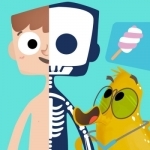
Doctor Justabout and the Human body
Education, Games and Stickers
App
Doctor Justabout is a fun and educational app that teaches how the systems and organs of the body...
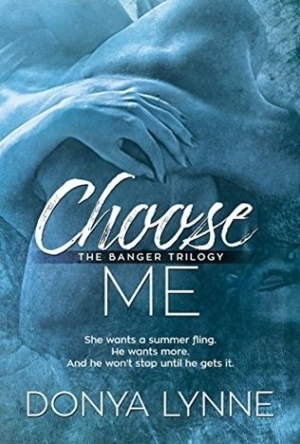
Choose Me (Banger Trilogy #1)
Book
She wants a sexy summer fling. He wants more. And he won’t stop until he gets it. NOTE: This...
Ivana A. | Diary of Difference (1171 KP) rated Sisters in Books
Oct 5, 2020
I am extremely happy and excited to be part of the blog tour for Sisters by Michelle Frances. Thank you to the team at Pan Macmillan - for sending me a copy in exchange for an honest review. Check out the other book bloggers that are part of the tour as well:
Synopsis:
Is blood really thicker than water?
Abby and Ellie were never close as children. Now in their thirties, they each harbour deep-rooted resentment for the other - Abby for her sister's looks and her status as their mother's favourite. Ellie meanwhile is envious of Abby's perfect husband and picturesque home, a villa on the sun-soaked Italian island of Elba.
When Abby invites Ellie to stay, both sisters see the break as a chance to relax and put aside their differences. But with their mother Susanna there too, all the simmering tensions of the past quickly rise to the surface. And Ellie suspects that Abby and their mother are keeping a dangerous secret . . .
But after a shocking act, the sisters have only each other to rely on. Vulnerable and scared, trusting each other will be the biggest risk of all . . .
My Thoughts:
Sisters by Michelle Frances was a very enjoyable and exciting ride for me. Not having read her previous books, I started reading without any expectations, hoping to enjoy the story for what it was. Two sisters - trying to improve their relationship, hopefully without their mother interfering.
What I got instead, was so much more! The suspense keeps building up from the very first chapter. The tension between the sisters is really awkward. The relationships between the mother and both daughters is very different and very concerning.
And then everything changes.
We have a surprising plot twists, and from that moment on, we are on a wild adventure. Old secrets will start coming up, things people thought were forgotten in the past. I did not know, and couldn't guess who the real villain is until the very end, and that was quite enjoyable for me! Everyone will tell you stories, everyone will say their own point of view. To you, everyone will seem like a villain and a victim at the same time, and this uncertainty will make you keep turning pages until you find out. Until the end.
I am glad I read Sisters by Michelle Frances. Another amazing suspense now added to my list. I highly recommend it to mystery, thriller and suspense fans, especially the ones that enjoy family drama.
Synopsis:
Is blood really thicker than water?
Abby and Ellie were never close as children. Now in their thirties, they each harbour deep-rooted resentment for the other - Abby for her sister's looks and her status as their mother's favourite. Ellie meanwhile is envious of Abby's perfect husband and picturesque home, a villa on the sun-soaked Italian island of Elba.
When Abby invites Ellie to stay, both sisters see the break as a chance to relax and put aside their differences. But with their mother Susanna there too, all the simmering tensions of the past quickly rise to the surface. And Ellie suspects that Abby and their mother are keeping a dangerous secret . . .
But after a shocking act, the sisters have only each other to rely on. Vulnerable and scared, trusting each other will be the biggest risk of all . . .
My Thoughts:
Sisters by Michelle Frances was a very enjoyable and exciting ride for me. Not having read her previous books, I started reading without any expectations, hoping to enjoy the story for what it was. Two sisters - trying to improve their relationship, hopefully without their mother interfering.
What I got instead, was so much more! The suspense keeps building up from the very first chapter. The tension between the sisters is really awkward. The relationships between the mother and both daughters is very different and very concerning.
And then everything changes.
We have a surprising plot twists, and from that moment on, we are on a wild adventure. Old secrets will start coming up, things people thought were forgotten in the past. I did not know, and couldn't guess who the real villain is until the very end, and that was quite enjoyable for me! Everyone will tell you stories, everyone will say their own point of view. To you, everyone will seem like a villain and a victim at the same time, and this uncertainty will make you keep turning pages until you find out. Until the end.
I am glad I read Sisters by Michelle Frances. Another amazing suspense now added to my list. I highly recommend it to mystery, thriller and suspense fans, especially the ones that enjoy family drama.
